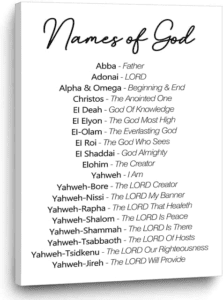
The Names of God: יהוה, the God of Israel
Studying the Bible can teach us so much about life, but perhaps the most important thing we can learn from the Bible is about God’s character. When we study, we see what God can do and how He interacts with His people. As His character is revealed, so are His attributes, and we can get to know who He is!
If you’re interested in even more names of God, here are other articles in this series you may enjoy.
The Names of God: Revealing God’s Personality Traits
The Names of God: Elohim, The Mighty One
The Names of God: Adonai, Our Lord and Master
Click here for a free printable PDF Names of God Chart to use in your studies!
If you’re new to the Hebrew language, starting with my posts on the Hebrew Alphabet and the Hebrew Vowels may be helpful.
Yahweh – יהוה
This name is the most common one of God used in the Bible. יהוה is used 6,823 times and found in all but three books of the Old Testament (Ecclesiastes, Esther, and Song of Songs). It’s called the Tetragrammaton, Greek for “made of four letters.” In English translations, it appears as “LORD” in all capital letters to distinguish it from other Hebrew words for God.
Since no vowels accompany these four consonants in the oldest texts, there’s some speculation on the pronunciation of this name. Many agree that it’s pronounced “Yahweh,” with the vowels appearing as יַהְוֶה, yet others propose that the vowels are as such instead יְהֹוָה. This second pronunciation would render another familiar name for God – “Yehovah” or the common translation of “Jehovah.”
Most Hebrew words are derived from a 3-consonant root word, and the words derived from that root have similar meanings. יהוה comes from the Hebrew root word meaning “to be.” This translation would make sense as God referred to Himself as “I AM,” a form of the verb “to be.”
יהוה is used as God’s name mostly in situations where He’s interacting with His people. One example is when He appeared to Moses in the burning bush (Ex. 3:2) or breathed life into Adam (Gen. 2:7).
A shortened form of Yahweh, Yah (יָהּ), is used in many places. When Moses and the people of Israel sing, “The LORD is my strength and song” (Ex. 15:2), Yah is the name used for “LORD.”
The Scriptures Large Print Duotone Charcoal Edition (ISR)
As the name of God is holy, many don’t speak it out of reverence and respect. Instead, it’s often replaced by “HaShem,” meaning “the name,” or “Adonai,” meaning “my Lord,” as well as other terms of honor.
Many Christians are interested in returning to more literal interpretations of scripture, including the name of God. The Scriptures Bible from the Institute for Scripture Research has restored יהוה as the name for God throughout the text, rather than replacing it with other words.
יהוה is combined with other words to show us His character even more precisely. Below are examples of this. Each of them reveals yet another aspect of God’s awesome character.
Yahweh Elohim יהוה אֱלֹהִים
This name can be translated as “LORD God,” but it emphasizes God’s creative nature as in Genesis 2:4. One variation on this is יְהוָֽה אֱלֹהָי, Yahweh Elohai, which means “the LORD my God” instead. Another variation is when God addresses His people: “I am the LORD your God.” This is Yahweh Elohechem, יְהוָה אֱלֹהֵיכֶֽם.
Yahweh El Elyon יהוה אֵל עֶלְיֹון
This term means “LORD God most high,” found in Genesis 14 when Melchizedek blesses Abram just before God promises him a son and countless descendants. It’s also found in Psalms in the form of praise to God.
Yahweh Elohei David יהוה אֱלֹהֵי דָּוִד
Isaiah prophecies to Hezekiah on his supposed deathbed that the “God of his father, David,” would add fifteen years to his life. We can see that God was indeed the God of King David as we get to know many aspects of God through David in Psalms and otherwise.
Yahweh Roie יהוה רֹעִי
Most Christians are very familiar with this aspect of God. This name means “God my shepherd” and is found in the first verse of Psalm 23. It’s translated as “The LORD is my shepherd…”.
Old Testament Hebrew Vocabulary Cards: Second Edition
Yahweh Tsuri V’goali יהוה צוּרִי וְגֹאֲלִי
Here’s another name given to God by King David in the Psalms. From Psalm 19:14, God is called David’s “rock and Redeemer” after giving glory to God for His Laws, judgments, and commands.
Yahweh Sali יהוה סַלְעִי
This name, also given by King David, means “God my hiding place.” This phrase is similar to “God, my rock and redeemer” above, but here, the word “rock” can also mean “cliff” or “boulder.” It can also be translated as “refuge.”
Yahweh Avienu יהוה אָבִינוּ
“God, our Father” is what this Hebrew name for God means. It’s found in the book of Isaiah, chapters 63 and 64, where Isaiah pleads for mercy for the people of Israel, as well as David’s prayer in 1 Chronicles 29:10-20.
Yahweh Shalom יהוה שָׁלֹום
“The LORD is peace” is what Gideon named the altar he built in Judges 6:24. This was just after an angel appeared to him and told him that God would help him defeat the Midianites, which he later did.
But wait, didn’t God bring war and not peace in this case? Why say that God is peace if He promised the Israelites a war victory?
The peace was brought to God’s people through the defeat of the Midianites because Midian had greatly oppressed the Israelites. Defeating them with God’s help brought freedom and peace.
Yahweh Rof’ekah יהוה רֹפְאֶךָ
Also, Yahweh Rafa (רָפָא) is a name God gave to Himself in Exodus 15:26. He said that he would spare the Hebrew people from the plagues he put on the Egyptians if they were obedient. This name means “healer,” and He has control over our bodies as our Creator. He can heal and protect.
Yahweh Yir’eh יהוה יִרְאֶה
This name comes from Genesis 22:14 when Abraham is about to sacrifice Isaac out of obedience to God. It means “God provides” or “God who sees”.
Although this name is commonly translated as “Jehovah Jireh,” there’s no “j” sound in Hebrew as there is in English, so a more accurate pronunciation of this name would be “Yuh-hoe-vah yeer-eh”.
For us today, throughout the Bible, even in situations of great persecution like what Paul experienced, God sees our circumstances and knows exactly what’s needed to fulfill His plan for His people. We can be sure that He’s faithful and will always provide!
Yahweh Elohai Yisrael יהוה אֱלֹהֵי יִשְׂרָאֵֽל
This one is used many times throughout the Old Testament to emphasize that our God is the one being referred to and to distinguish Him from the gods of the people in the surrounding areas.
Yahweh Nissie יהוה נִסִּי
Used only once in the Bible, Exodus 17:15, this is the name Moses gave the altar he built after the Israelites defeated the Amalekites. It means “God, my banner.” The word “banner” could also be “exaltation” or “refuge” as well. Whichever of those he meant, Moses was attributing their victory to God in naming the altar.
Yahweh Maqadashem יהוה מְקַדִּשְׁכֶֽם
This is a name God gives Himself, mostly while He’s giving His Law to His people. It means “LORD, your sanctifier.” We don’t have the power to sanctify ourselves or anything, for that matter. Only our holy God can declare something holy.
Yahweh Oseinu יהוה עֹשֵׂנוּ
This name refers to God’s creative abilities and means “God, our Maker.” It’s found in Psalm 95, which implores us to worship Him and recognize that we’re His people. God is our Creator! He made us, and we are His! Isn’t that amazing?!
Yahweh Shamah יהוה שָׁמָּה
“God is there” is what this name means. From Ezekiel 48:35, this is a prophecy stating the name of the city God will inhabit in the Millennial Kingdom. The city’s name clarifies that God will be physically present there. How amazing! I wonder what it will be like!
Yahweh Tsidqenu יהוה צִדְקֵנוּ
Tsidqenu (pronounced tseed-qay-noo) means righteousness, so this name means “God, our righteousness.” It’s used twice in Jeremiah, chapters 23 and 33, to predict the Messiah. We’re not righteous. But through Jesus, we can appear righteous before God!
For a more in-depth study of more names of God, check out His Names are Wonderful: Getting to Know God Through His Hebrew Names by Elizabeth Vander Meulen and Barbara Malden.








Genesis 1:1 Elohim means 3 ? Elohi Elohi lama sabaktani….Elohi means 1? 2? 3?
Elohim means “God” or “gods”. It doesn’t mean three in Hebrew. Shalosh means three.
Elohi means “my God”, and Jesus’s statement in Matt. 27:46 was probably a quote from Psalm 22:1, which says “Eli Eli, ma ahzavtani” or “My God, my God, why have you forsaken me?”
Hi Hebrew Roots mom , first of all, I want to thank you for your work on this website. Although this is my first time here , there are lots of good works done which I am sure will be of good use to preaching His Word! Keep it up! I have a question regarding some Christian iterpretation of Yahweh – יהוה . I wonder if you have heard about the 4 letters each letter to mean behold (ה) – nail (ו) – behold (ה) – hand (י) effectively implying that YHWH is hidden meaning for Sacrifice /cruxifiction. Whilst I have no training in Hebrew at all and only arm with the almighty “google” search, although I can see ה can mean behold , י can mean hand/ strength of God but I can only see ו to mean hook or peg – I can’t see it to mean nail. Quite a few Christian sources does refer ו as to mean nail , but none of Jewish sources says nails , only hook.
So I would like to know what your thoughts are on this? does Vav ו can it mean nail in Hebrew?
One but needs to think as a child. Water. Ice. Mist. All of which are the same but very, very different.
I alone am God and will share My Glory with no one, the Living God in the flesh was crucified died & was buried, rose, ascended into heaven, will return & reign, then all will know the Truth ????????????❤
Hebrew Roots Mom et al. – this addresses “freely received, freely given” quite well:
https://walkingwithgodforlife.com/to-freely-give-as-we-have-freely-received/
We agree – your website/financial investments and the Temple in Jerusalem are “very different things.” The resources you share are good. As a webmaster for yrs, I agree – it costs quite a bit to pay for/run an only presence & your costs for hardcopies are substantial as well.
We appreciate what you’re doing – keep up the good work & may you be blessed! Doug
Thank you, Doug! And that was a great post. Thank you for sharing!
Shalom Hebrew Roots Mom, I was born raised Catholic. Hated it! Came to Yahashua in 1979. Wasn’t until 2015 was brought to truth in Yahweh. Still young in Yahweh. I am now 60 years old. Been reading scripture for over 40 years. And still know little as Yahweh only gives us what we can endure. Yes, I now read the whole Bible as it is His word of truth. You can’t read just the New Testiment or the old. It is all His Word from the beginning to the end. Funny it has taken me so long to understand. But I know He must take us through the journey for us to fully understand. What I have come to understand is there is no J in Hebrew. If one looks at it realistically there are a Senior and a Junior in names. Yahweh and Yahashua. Both with the suffix Yah. Like John and John the second. People tend to name their sons after them. But Yahweh is Powerful, He named his son after Him but not above Him. There is a verse in the old testiment. Can’t recall exactly where it is but it says, Yahweh called apron Yayweh. He 2as. Actually calling up to his Father. Anyway just my thoughts and I. Love all people and may He bless you and keep you. Shalom
I am a Christian Mom of two adults; a 30 year old son who is blind and has autism who was unfortunately taken away from me over 4 years ago and placed in a group home. Plus I have an almost 28 year old daughter who has come along way since attempting suicide in February of 2010. God uses what we go through to help or encourage others. She is currently doing her internship that will finish in August of 2022 to become a Licensed Counselor with her Master’s Degree. I have begun to write my first book; the LORD has placed 19 books in total to write with 18 of them to encourage other women since I have been through an incredible amount of trials in my life even before what I mentioned before. I want to talk to women’s groups at churches, addiction facilities and even possibly in women’s prison’s because of all the the LORD has done for me throughout my life. I have been blessed with knowing three Jewish families over the years and they have truly been a blessing to me. May the LORD always shine His face upon you, drawing Him closer to you each and everyday. Make Him the LORD of your life truly and He will do miracles for you as he has done for me.
If Yehoshua did not approve of merchants about the temple, you should not engage in commerce either, selling so-called items of faith (John 2:15). The gospel is free and you have no money to be making off Bibles (Matthew 10:8)
SB,
Thank you for visiting my website.
My site and the Temple are very different things. There are specific laws regarding the Temple and they can’t be applied to just anywhere, such as a blog on the internet or even a church, for that matter. I’m sure Yeshua wouldn’t find my website something to defend as he defended the sacred Temple.
I suggest you do some research on the story of Yeshua and his interaction with the money changers. In short, the selling of animals for sacrifice at the Temple was required for people to fulfill the Law. The problem he had was how they went about it.
There are many great resources on what was really going in this story culturally but here are a couple to start with:
https://www.jewishvirtuallibrary.org/money-changers
https://www.bible-history.com/backd2/moneychangers.html
I see no mention of Bibles in Matthew 10:8, nor resources purchased for learning Hebrew, etc. When Jesus was sending his disciples out, he also told them not to take an extra coat or to acquire money for healing the sick and casting out demons. I agree with you that the Gospel is free but I assure you that maintaining a website, purchasing Bibles, and ministry in general, is not.
Running a website costs hundreds to thousands of dollars per year and that doesn’t include the hours it takes to research and write content and answer emails and comments, as well as maintain a social media presence. My family paid to start this website with no promise of income from it. We do it as a ministry.
The Bibles I purchase are not free either. In fact, I attempt to find specialty Bibles that can be difficult to find and some are quite costly. One of the main goals I have in running my store is to offer items Christians in this faith need at an affordable price and, if you shop around, you’ll find that’s the case.
I’m curious to see how ministry works according to your reasoning. Who pays for translation, printing & binding, and distribution of Bibles? Should pastors and rabbis be paid? How do missionaries care for their families? Can Christian authors charge money for their books? If not, who pays their expenses?
Are you suggesting my family should give above our offerings by spending thousands on Bibles, etc. and giving these items away? There are ministries that give Bibles away for free. They run off of donations because they, too, need money to operate. How does this type of ministry play out in your life?